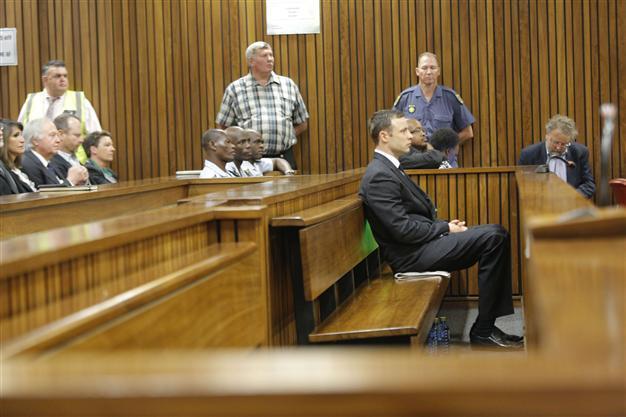South African judge clears Pistorius of murder
PRETORIA - Reuters

South African Paralympic athlete Oscar Pistorius sits in the dock during the verdict in his murder trial, Pretoria, South Africa, on September 11, 2014. AFP Photo
A South African judge cleared Oscar Pistorius of all murder charges on Thursday, saying prosecutors had failed to prove the Olympic and Paralympic track star intended to kill his girlfriend or an imagined intruder on Valentine's Day last year.
As judge Thokozile Masipa delivered her decision, Pistorius, who would have faced at least 25 years behind bars for premeditated murder, sat sobbing in the dock, tears streaming down his cheeks.
A verdict on the less serious charge of culpable homicide is still to come.
Although Masipa described the 27-year-old as a "very poor" and "evasive" witness, she said it did not mean the track star was necessarily guilty in a case she said was based entirely on circumstantial evidence.
"The state has not proved beyond reasonable doubt that the accused is guilty of premeditated murder," Masipa told the Pretoria High Court. "There are just not enough facts to support such a finding."
She then proceeded to absolve Pistorius, who said he shot model and law graduate Reeva Steenkamp in the mistaken belief she was an intruder hiding in a toilet cubicle, of a lesser murder charge that falls short of a direct intention to kill.
"Clearly he did not subjectively foresee this as a possibility that he would kill the person behind the door - let alone the deceased - as he thought she was in the bedroom," she told the packed courtroom.
'Fickle humans' Although he has been cleared of the two murder charges, he could still be convicted of culpable homicide for the negligent or reckless killing of Steenkamp, hit by four 9mm rounds fired through the toilet door at Pistorius's luxury Pretoria home.
Culpable homicide carries up to 15 years in jail.
Alternatively the double-amputee could be acquitted, allowing him to leave the court and potentially resume his career as one of the biggest names in world athletics.
As the 66-year-old Masipa began her methodical review of the 41-day trial and the charges - which also include three unrelated firearms offences - a pained and forlorn Pistorius bowed his head in the dock.
Masipa, only the second black woman to rise to the bench in South Africa, has remained impassive throughout the often dramatic and gruesome court proceedings, seemingly impervious to the global interest in a case that has drawn comparisons to the 1995 murder trial of American football star OJ Simpson.
In one early blow to Pistorius, she said defence allegations of police contamination of the crime scene "paled into insignificance".
However, as she drew up a detailed timeline of the shooting, she questioned the reliability of multiple state witnesses, including that of a neighbour who testified to hearing the terrified screams of a woman before and during shots.
She also rejected a mass of instant messaging evidence presented by both prosecution and defence to suggest, respectively, that the couple's relationship was on the rocks or loving and strong.
"Normal relationships are dynamic and unpredictable most of the time, while human beings are fickle," she said. "None of the evidence of a loving relationship, or a relationship turned sour, can assist this court."
Gripping Trial The case has transfixed millions around the world who admired Pistorius, a man whose lower legs were amputated as a baby but who reached the semi-finals of the 400 metres at the London Olympics in 2012.
That same year, Time magazine included him in its list of the world's 100 most influential people, "the definition of global inspiration".
In sports-mad South Africa, the shooting caused an even bigger impact, the stunning downfall of a sporting hero feted by black and white alike in a society still divided by its racist past.
The case continued to inflame passions even after Masipa delivered her decision.
"We are here in support of all women who have been abused or killed by their partners," said supermarket worker Joyce Radebe, who took the day off to demonstrate outside the court with members of the African National Congress Women's League.
Prosecutor Gerrie Nel - the theatrical face of a prosecution that has watched its case stripped away by Masipa - painted Pistorius as a gun-obsessed hot-head who whooped with joy when he blew apart a water-melon with a high-calibre pistol, democratic South Africa - glued to the live television feed - was forced to ask itself some uncomfortable questions.
Foremost among them were queries about male attitudes to weapons and violence and the reality of whites and blacks still inhabiting largely different worlds.
Why, commentators asked, of more than 30 witnesses called were only two - a security guard and police ballistics expert - black?
Why, Masipa aside, were nearly all the leading protagonists white in a nation where whites are just 10 percent of the population?
Was South Africa really so dangerous that Pistorius and his friends were justified in feeling the need to carry handguns?
And, as backdrop to it all, the universal white suburban fear: how to protect yourself from an intruder - assumed to be black - in the middle of the night, a fear hardwired by years of apartheid propaganda about the 'swart gevaar' (black danger).
